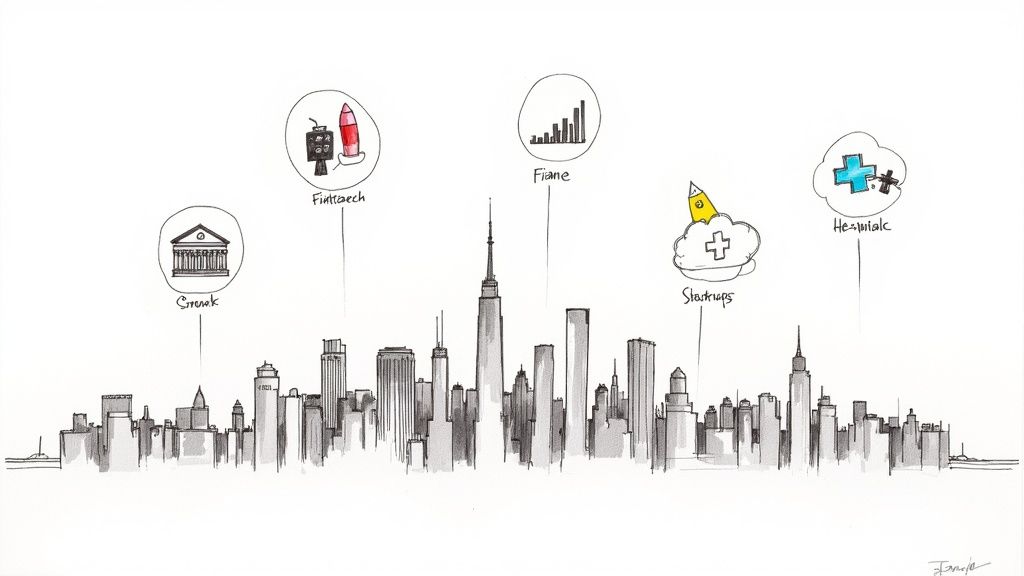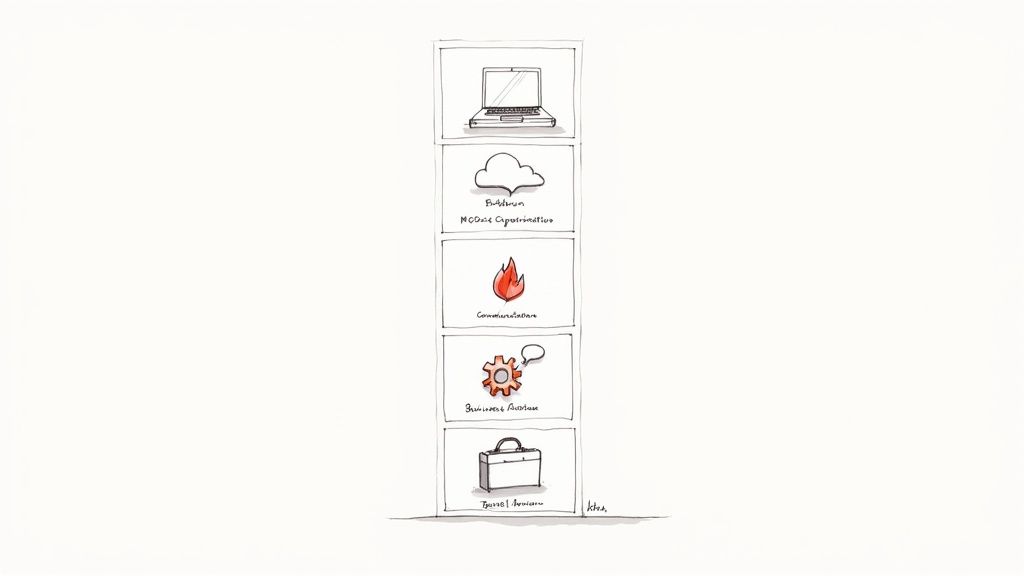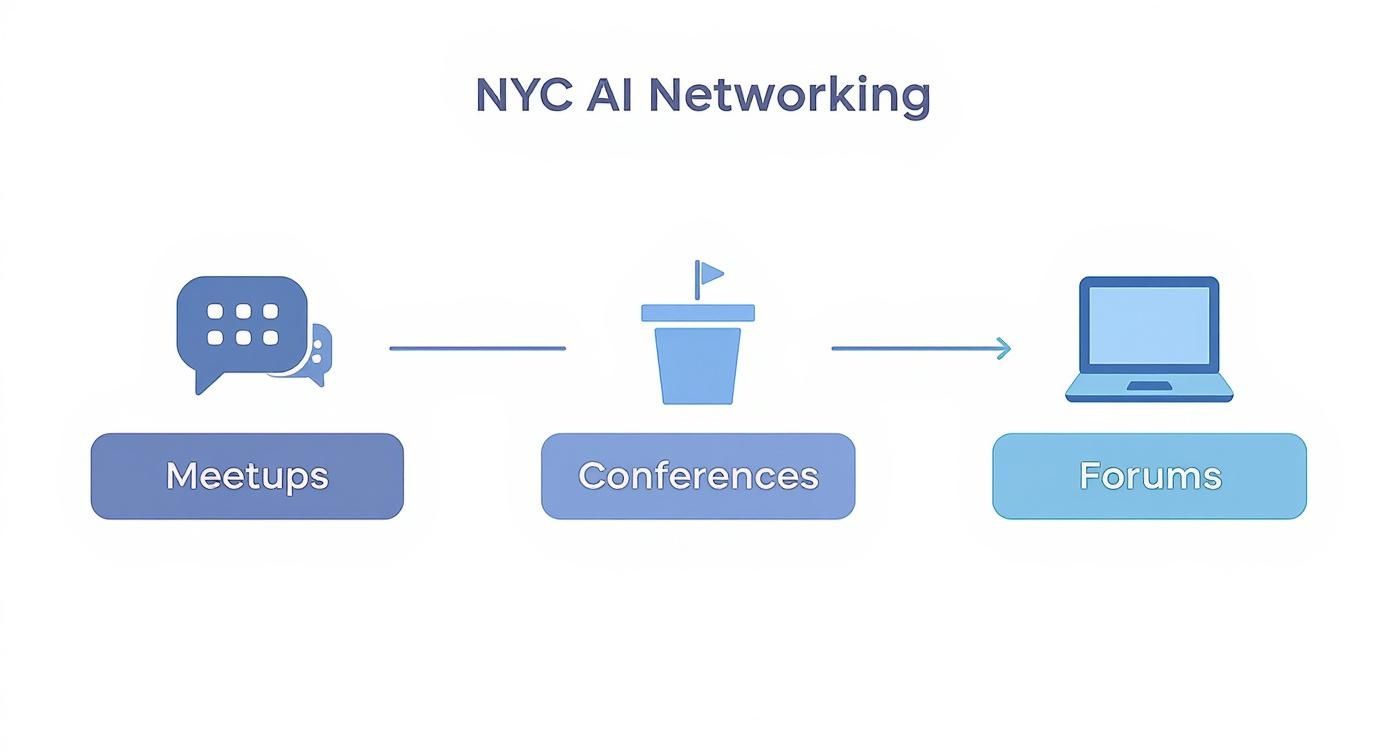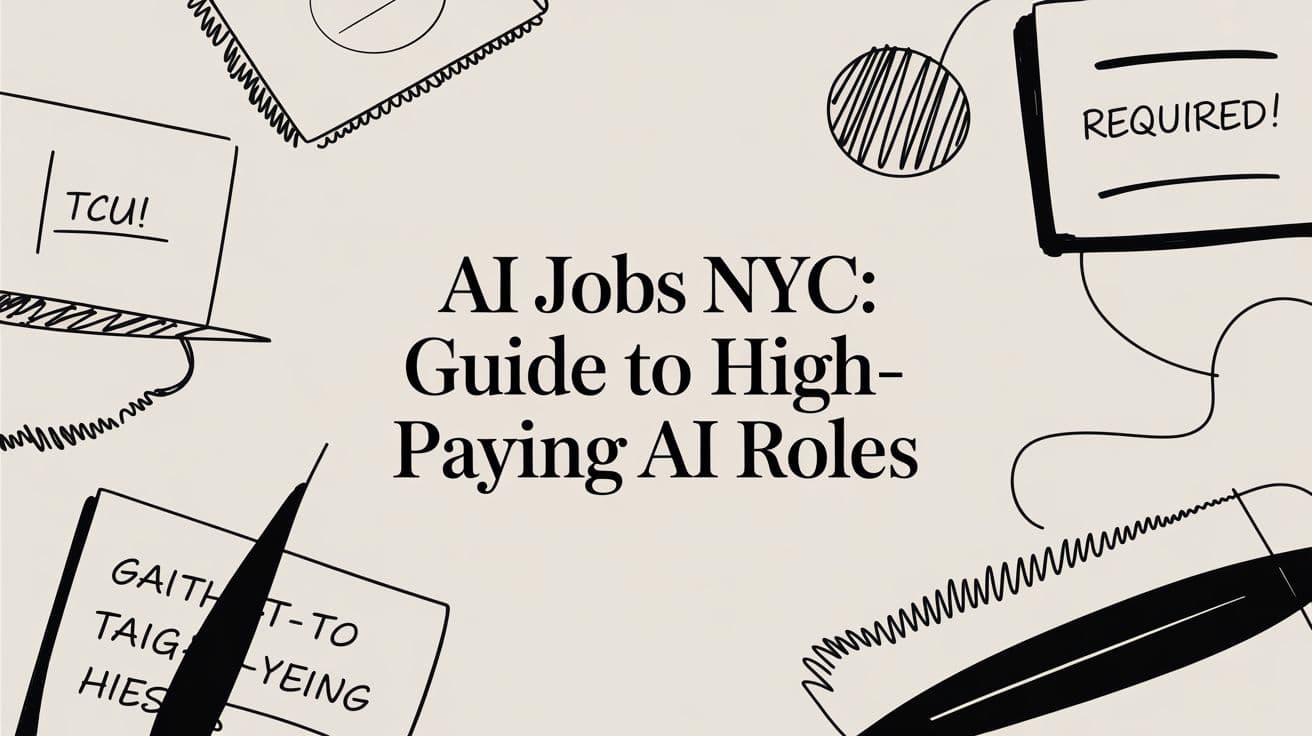If you're looking for a high-paying AI job in NYC, stop thinking like you're in Silicon Valley. The real money here isn't just in big tech; it's in applied roles where AI meets finance, media, and medicine.
New York's ecosystem is all about specialists who can turn complex data models into tangible business results. That's why roles like Machine Learning Engineer and AI Product Manager are popping up all over Wall Street and Madison Avenue.
This isn't about spamming resumes. It's about a targeted strategy.
Decode the NYC AI Job Market (It's Not a Mini-SF)

Before touching your resume, get one thing straight: the AI job market in New York City has its own DNA. It’s not a smaller version of the West Coast. While the Bay Area might have more pure research roles, NYC is the undisputed king of applied AI.
This is where algorithms hit the trading floor, reshape ad campaigns, and improve patient outcomes.
Companies here aren't building AI for the sake of it. They're using it to solve specific, high-stakes business problems. This creates a huge demand for people who can bridge the gap between deep technical skills and real-world business impact.
Pinpoint Where the Real Opportunities Are
You can forget generic national job trends for a minute. NYC's AI jobs are concentrated in the powerhouse sectors that define the city's economy.
A report from the NYC Comptroller's Office (August 2023) shows that 41% of tech occupations and 37% of finance roles have high exposure to AI. That tells you exactly where the most sophisticated jobs are.
So, where should you be looking?
- Finance and FinTech: Think algorithmic trading, fraud detection, and risk management. Big players like JPMorgan Chase and Morgan Stanley, plus countless hedge funds, are constantly hiring.
- Media and Advertising: From the recommendation engines at Spotify to the programmatic ad bidding in Google's Chelsea Market office, this sector is starving for data scientists.
- Healthcare and BioTech: With world-class hospitals and research centers, NYC uses AI for everything from analyzing diagnostic images to accelerating drug discovery.
To give you a clearer picture, here's a quick breakdown of the local landscape.
NYC AI Job Market At a Glance
The AI job market in NYC is a collection of specialized ecosystems. Use this table to target your search.
| Key Industry | High-Demand AI Roles | Major NYC Employers |
|---|---|---|
| Finance / FinTech | ML Engineer, Quant Analyst, Data Scientist | JPMorgan Chase, Goldman Sachs, Morgan Stanley, Bloomberg |
| Media / Advertising | Data Scientist, AI Product Manager, ML Ops Engineer | Google, Meta, Spotify, The New York Times |
| Healthcare / BioTech | AI Research Scientist, Clinical Data Scientist, Bioinformatician | Mount Sinai, Pfizer, Flatiron Health, Regeneron |
| Retail / E-commerce | Personalization Specialist, Supply Chain Data Scientist | Etsy, Macy's, Warby Parker |
This table highlights the core of the NYC AI scene. The city's traditional industries have become massive AI employers, creating unique roles you won't find anywhere else.
Choose Your Path: Pure Research vs. Applied AI
This is a critical distinction to make early on. Many job seekers, especially those with strong academic backgrounds, fixate on "AI Research Scientist" titles. In New York, those roles are far less common than their applied counterparts.
The vast majority of ai jobs nyc listings are for roles that build, deploy, and maintain AI systems within a business.
Unless you have a Ph.D. from a top-tier lab, you should focus on applied roles.
Here’s a simple way to think about it:
- Applied AI Roles (High Volume): This includes Machine Learning Engineer, AI Specialist, Data Scientist, and AI Product Manager. These jobs are about building practical solutions.
- Research Roles (Low Volume): These are your Research Scientist and AI Researcher positions. They're focused on pushing theoretical boundaries and are mostly found at places like Google AI or major universities.
Understanding this difference is the first step toward building a realistic job search. Knowing the strategies for hiring AI developers gives you a peek into the hiring manager's playbook. It's also worth remembering that the growth of the AI search market is influencing how recruiters and platforms source candidates.
The AI Skills NYC Employers Actually Demand

Putting "Python" on your resume for a top ai jobs nyc opening is like listing "typing" as a skill. It’s the bare minimum. New York's top employers are hunting for a specific blend of deep technical skill and sharp business instinct.
They don't just need people who can build a model. They need people who can deploy it, maintain it, and connect its performance to the company's bottom line.
It's the difference between knowing the theory and having the scars from making it work under pressure.
Show Core Technical Skills Beyond Python
Python is the language of AI, but specific frameworks and libraries are what hiring managers scan for. They need proof you can slot into their tech stack on day one.
- Deep Learning Frameworks: You need proficiency in PyTorch or TensorFlow. It’s non-negotiable. Be ready to walk them through projects where you used these to build and train complex models.
- NLP Libraries: For media, ad-tech, or any company with text data, experience with libraries like Hugging Face Transformers or spaCy is a must.
- Data Manipulation and Analysis: Expertise in Pandas, NumPy, and Scikit-learn is a baseline expectation.
The candidates who stand out can explain why they chose a specific tool for a problem, not just what they used.
Prove Your Cloud and MLOps Expertise
A model that only exists on your laptop is worthless to a business. NYC employers are obsessed with candidates who get AI into production. This is where your cloud and MLOps skills become a massive advantage.
You need hands-on experience with at least one major cloud provider, usually AWS or Google Cloud Platform (GCP). Hiring managers will probe for your familiarity with:
- Cloud ML Services: Can you navigate tools like Amazon SageMaker or Google AI Platform to build, train, and deploy models at scale?
- Containerization: Experience with Docker and Kubernetes is a huge plus. It shows you know how to package and manage applications in a real-world environment.
- MLOps Tooling: Do you know your way around tools like MLflow or Kubeflow for tracking experiments and versioning models?
This MLOps skillset signals that you think about the entire lifecycle of an AI product. It also ties into modern concepts like Generative Engine Optimization, where deep technical knowledge of how systems process information impacts business visibility. You can learn more about what is Generative Engine Optimization to see how these worlds connect.
Develop Soft Skills That Translate to Hard Cash
In New York's commercial world, pure technical ability isn't enough. The highest-paid AI professionals are those who can translate between the data science team and the C-suite.
Mini Case Study 1: The FinTech Failure A hedge fund hired a brilliant quant who built a trading model with 92% backtested accuracy. The problem? He couldn't explain its logic to the portfolio managers, who wouldn’t trust a "black box" with millions. The model was never deployed. The analyst was gone in six months.
Mini Case Study 2: The Media Success Story A Data Scientist at a streaming service used NLP to analyze user comments, discovering a huge demand for a new content genre. She built a simple dashboard to show her findings to the content team. The result was a pilot program that boosted user engagement by 15%. She was promoted to lead a new analytics division.
The lesson is painfully clear. You must develop and showcase these non-technical skills:
- Business Acumen: Understand the industry you're targeting. For a FinTech role, read up on market trends.
- Clear Communication: Practice explaining complex ideas in simple terms. Can you describe a recurrent neural network to a marketing manager?
- Problem-First Mindset: Frame your portfolio projects around the business problem they solved. Don't lead with the algorithm you used. Start with the "why," then get to the "how."
A Practical Blueprint for Your AI Job Search
Scrolling through LinkedIn for ai jobs nyc is a fast track to getting nowhere. The best roles are often snapped up before they even hit the major job boards.
You need a real strategy. This isn't about spamming more applications; it's about making every single one count.
Hunt for Jobs Beyond the Big Boards
If you’re only looking on Indeed or LinkedIn, you’re missing out. The most competitive gigs are found in the city's niche AI ecosystems.
- Industry-Specific Platforms: Hunting for a FinTech role? Watch sites like eFinancialCareers. For tech, Built In NYC is a goldmine for jobs at fast-growing startups.
- Targeted Company Career Pages: Pick 10-15 companies you'd kill to work for—think Spotify, Morgan Stanley, or Flatiron Health. Bookmark their career pages and check them directly.
- VC Portfolio Pages: This is a pro move. Look up the portfolios of NYC-based VCs like Union Square Ventures or Insight Partners. The companies they've invested in are often hiring like crazy but don't have a massive recruiting budget.
This flips the script. You stop waiting for jobs to come to you and start actively hunting them down.
Engineer Your Resume for Humans and Bots
Your resume has two audiences: the Applicant Tracking System (ATS) bot and the human hiring manager. You have to impress both.
AI-related job postings have gone through the roof, forcing recruiters to lean heavily on software filters. Keyword optimization isn't optional. Find more data on the NYC AI job market over at AIMaps.ai.
First, mirror the language in the job description. If it asks for "PyTorch" and "NLP," make sure those exact words are on your resume.
Your resume's sole purpose is to get you an interview by proving you can solve the company's specific problem.
Next, get obsessed with quantifiable achievements.
- Don't say: "Built a fraud detection model."
- Instead, say: "Developed a random forest model that reduced false positives by 18%, saving an estimated $250,000 annually."
This translates your technical skills into business value. It’s similar to good SEO; providing clear, valuable information makes you more visible, a concept we explore in our guide on how to get your content cited by ChatGPT.
Tailor Your Portfolio with a Mini Case Study
Your portfolio is your best weapon. It’s the concrete proof behind the claims on your resume. For every application, highlight one or two projects that are hyper-relevant to that specific role.
Mini Case Study: Tailoring a Project for a FinTech Data Scientist Role
- The Job: A Data Scientist role at a Manhattan FinTech startup focused on algorithmic trading.
- Original Project Description: "Stock Price Predictor. A project using an LSTM model to predict stock prices based on historical data." (Too generic.)
- Tailored Project Description: "High-Frequency Trading Signal Generator. Developed an LSTM model with custom feature engineering (e.g., rolling volatility, RSI) to identify short-term price movements in forex markets. The model achieved a 62% directional accuracy in backtesting on tick-level data, demonstrating its potential for alpha generation."
See the difference? The tailored version is specific, speaks the industry's language, and directly addresses the skills they asked for. This is what grabs a hiring manager's attention.
Network in the NYC AI Scene Without Being Awkward
In New York City, your network is a launchpad for the best ai jobs nyc offers. But “networking” sounds awful.
Forget that. The real goal isn't to collect business cards. It's to build genuine relationships.
This means flipping your mindset from "What can I get?" to "What can I learn and contribute?" Lead with curiosity instead of desperation.
Find Your Tribe at Smaller Events
Mega-conferences are loud and overwhelming. The best connections happen in smaller, focused settings.
- Targeted Meetups: Groups like the NYC AI & ML Meetup are absolute gold. These events pull in engineers from top firms who are there to genuinely learn.
- University Events: Keep an eye on public lectures at places like NYU's Center for Data Science or Columbia's Data Science Institute.
- Online Communities: Don't sleep on NYC-specific channels on Discord or Slack. You can build a reputation just by asking smart questions.
The key is consistency. Show up to the same meetup group a few times. You stop being a stranger and become a familiar face.
Start a Conversation That Isn't Cringeworthy
You're at the event. Now what? The secret is to lead with genuine curiosity about their work, not your job search. Ditch the elevator pitch.
Instead of the generic, "So, what do you do?"—try something specific.
"That was a great point the speaker made about diffusion models. How is your team thinking about applying them?"
A question like this proves you were listening. It opens the door to a real technical chat. Most importantly, it positions you as a peer.
Write a Follow-Up That Leads Somewhere
A great chat is pointless without the right follow-up. The goal is to keep the conversation going and gently pivot it toward an informational interview.
Mini Case Study: From LinkedIn Connection to Informational Interview
- The Context: You met an AI Product Manager from Spotify at an NYC AI meetup and chatted about recommendation algorithms.
- The Wrong Follow-Up: "Hi [Name], great meeting you. I'm looking for AI jobs in NYC. Can you look at my resume?" (Too aggressive).
- The Right Follow-Up (LinkedIn Message): "Hi [Name], great chatting about recommendation systems last night. I was particularly interested in your point about balancing user discovery with exploitation. I found an article on that topic I thought you might find useful: [link]. If you have 15 minutes in the coming weeks, I’d love to hear more about your path to becoming an AI PM at Spotify. I'm exploring similar roles and would really value your perspective."
This message lands perfectly because it adds value first, makes a specific reference, and has a small, low-commitment request. Most professionals are happy to give 15 minutes of advice.
Navigate the AI Technical Interview and Salary Talks
You've made it through the first hurdles. Now for the real test: the technical interview. For anyone chasing ai jobs nyc, this stage is a series of high-stakes challenges.
The key is knowing what's coming. A scrappy startup in SoHo will grill you differently than a massive investment bank on Wall Street.
Big tech and finance love algorithmic rigor. Expect intense whiteboarding sessions. Startups, on the other hand, tend to be more practical. They might give you a take-home project or ask you to debug a real-world machine learning model live.
They don't just want to see if you can code. They want to see how you think under pressure.

Master the Multi-Stage Interview Gauntlet
Technical interviews in NYC are almost never a one-and-done deal. You'll likely face a live coding challenge, a system design deep-dive, and a behavioral round.
Mini Case Study: The Machine Learning Engineer Interview
- The Candidate: "Maria," a data scientist with 3 years of experience.
- The Process: A four-stage interview loop.
- Stage 1 (Phone Screen): A 45-minute chat with a senior engineer about her portfolio and core ML concepts.
- Stage 2 (Live Coding): A one-hour session on CoderPad. Maria was asked to implement and optimize a cosine similarity function. The key was talking through her thought process aloud.
- Stage 3 (System Design): A one-hour whiteboard session to design a personalized news headline system. Maria emphasized scalability and low latency.
- Stage 4 (Behavioral & Project Deep-Dive): The final round with the hiring manager. Maria walked them through a past project where she deployed a model that increased user engagement by 12%. She tied technical work directly to a business outcome.
Maria got the offer. She practiced on LeetCode and studied system design patterns, but her ability to communicate her impact is what set her apart.
Talk Money with Confidence in a High-Cost Market
Once the offer lands, it's time to negotiate. Many people leave money on the table, especially in an expensive market like New York. Anchor the conversation in data, not what "feels" right.
A 2023 report from the NYC Comptroller's office paints a clear picture. The median advertised hourly wage is around $84.06, but salaried roles are where it gets serious.
- Computer and Information Research Scientists average $151,470.
- Software Developers pull in $123,780.
This demand is fueled by giants like Bloomberg and JPMorgan Chase. You can dig into the full report to get familiar with these compensation benchmarks for AI jobs.
When you get that first offer, don't accept on the spot.
Always express genuine enthusiasm first, then pivot to compensation. "I'm incredibly excited about this opportunity. Based on my research into similar roles in NYC and my experience level, I was expecting a base salary closer to the [Your Target Number] range."
Remember, you’re negotiating the entire package—base salary, bonus, and equity. Coming to the table with solid data transforms an awkward chat into a standard business negotiation.
Typical AI Salaries: NYC vs. US Average
The salary bump for working in NYC is significant. It's driven by the high concentration of companies competing for top talent and the higher cost of living.
| AI Role Title | Average NYC Salary Range | US National Average Salary Range |
|---|---|---|
| Machine Learning Engineer | $150,000 - $220,000 | $120,000 - $175,000 |
| Data Scientist | $140,000 - $200,000 | $110,000 - $160,000 |
| AI Research Scientist | $160,000 - $250,000+ | $135,000 - $200,000+ |
| AI Product Manager | $155,000 - $210,000 | $130,000 - $180,000 |
| Data Engineer | $130,000 - $190,000 | $105,000 - $155,000 |
As you can see, the "NYC premium" is real. Knowing these numbers helps you walk into salary discussions with confidence.
Your Top Questions About AI Jobs in NYC, Answered
Getting straight answers is the first step to focusing your job search and cutting through the noise.
"Do I Really Need a PhD to Get a Good AI Job in NYC?"
No, not for most roles.
For a pure research scientist position at a place like Google AI, a PhD is still the gold standard. But for the vast majority of applied AI jobs in finance and media, practical skills count more. For roles like Machine Learning Engineer, a strong portfolio paired with a Master's or even a Bachelor's degree is often enough.
Companies want to see what you can build.
"Which NYC Industry Pays the Most for AI Talent?"
Finance. Hands down. High-frequency trading (HFT) firms and quantitative hedge funds offer the most eye-watering compensation packages.
Firms like Jane Street and Two Sigma are in a constant arms race for people who can build sophisticated predictive models. The bonus potential in finance can push your total compensation into a different league.
"How Important Is My Portfolio, Really?"
It’s everything. Your GitHub or personal website is your proof of work, and it speaks louder than any bullet point on a resume.
For NYC roles, you can't just have a generic portfolio. Tailor it to the industries you're targeting.
- Applying to FinTech? Show off a project on algorithmic trading or fraud detection.
- Targeting a media company? Build a content recommendation engine or a sentiment analysis tool.
A generic portfolio gets a generic response. A tailored portfolio shows a hiring manager you've already started thinking about their specific problems.
"Are Most AI Jobs in NYC Remote or In-Office?"
The pendulum is swinging back toward hybrid models. While you can find fully remote roles, most large employers in NYC's finance and tech worlds now expect you in the office two to three days per week.
The rationale is that it sparks better collaboration. Be realistic about this trend and check the job description for the company's specific policy. As you think about the future of work, it's natural to also ask: Will AI Take My Job?
Your Next Step
Your search for an AI job in NYC shouldn't be a numbers game. It's a strategy game.
- Pick Your Target: Don't spray and pray. Choose one industry (FinTech, Media, Healthcare) and go deep.
- Tailor Your Proof: Refine one portfolio project to solve a specific problem for that industry. Quantify your results.
- Make One Connection: Find one person on LinkedIn who works at your target company. Send them a thoughtful, value-first message like the one above.
Stop applying for everything. Start targeting the right things. That is how you win in this market.

